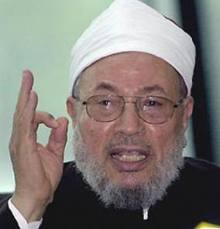Riyadh, Jan 1: The Arab world witnessed issuance of a flurry of religious edicts (fatwas) during 2012, most of which became controversial due to their strange nature and political dimensions.
These included a fatwa forbidding non-Palestinian Muslims from visiting Jerusalem, Islam’s third holiest city, and a ban on playing football.
Some of these fatwas seemed to have the hallmark of the Arab Spring, according to a report in Al-Hayat newspaper.

Among the most controversial fatwas, there was one by renowned Islamic scholar Sheikh Yusuf Al-Qaradawi, who is the chairman of the International Union for Muslim Scholars (IUMS).
His fatwa came as a disapproval of the Palestine President Mahmoud Abbas’s call for Arabs and Muslims to visit occupied Jerusalem, commenting that this is not accepted in Islam.
In the fatwa issued earlier in 2012, Sheikh Al-Qaradawi said: “The Palestinians are entitled to enter the holy city as they please, but the Arab and Muslim people are not.” The scholar explained that this is prohibited for the purpose of not legitimizing the Israeli occupation.
“Such a visit legitimizes the entity of the usurper of Muslim lands, and would force Muslim visitors to deal with the embassy of the enemy to get a visa.”
The Islamic Ummah as a whole should be in a position of responsibility to defend the Arab holy city, not the Palestinian people only, he said.
Earlier this year, another fatwa came from Sheikh Abdul Moneim Al-Shahat, who is also an Egyptian like Sheikh Al-Qaradawi.
Al-Shahat, spokesman of the Salafi Preaching Movement, ruled that football is forbidden in Islam in the first place.
While delivering a sermon in a mosque in Alexandria, he said: “Only three sports are allowed in Islam: javelin throw, swimming, and horseback riding. Other sports are forbidden.”
Later, he issued a clarification, saying that he was referring to professional football that has commercial value. The provocation for Al-Shahat’s fatwa was the disaster at the Port Said stadium in northern Egypt that killed around 80 football fans on February 1, 2012.
Suleiman Al-Olwan, a Saudi scholar, issued a fatwa that football players are evildoers and that the game prevents Muslims from practicing their religion and ideology.
Last week, Sheikh Muhammad Al-Saeedi, professor of Shariah at Makkah’s Umm Al-Qura University, ruled that prayer against anyone, even if it is a minister, is permissible.
The fatwa followed threats from some people to pray against Labor Minister Adel Fakieh in objection of the minister’s vigorous Saudization drive.
Most of the controversial fatwas had originated from Egypt in the second year of the Arab Spring.
Marjan Al-Gohari, a member of a Salafi jihadist group, issued a fatwa to destroy pyramids and the Sphinx.
He wanted these antiquities demolished just as Prophet Muhammad (peace be upon him) destroyed the idols he found upon his conquest of Makkah.
Another scholar, also a Salafi member in the dissolved parliament, proposed a draft law to reduce the age of marriage and fix it at 14.
The Egyptian Ifta Council issued a fatwa forbidding beating students at schools.
In Mauritania, the advisor of President Mohamed Ould Abdel Aziz issued a fatwa banning women from becoming presidents, even though they are allowed to contest the elections.
Islamic scholar and presidential advisor Aslamo Ould Sidi Al-Mustafa said: “Women can run for the presidency as long as they have no chance of winning. They can just do that for fun.”
The fatwa attracted criticism from the Association of Female Heads of Families, one of Mauritania’s most prominent rights organizations for women.
According to the association, the fatwa constitutes a flagrant violation of women’s rights as well as Mauritanian laws. Bowing to pressure from pressure groups, the government was forced to form a Supreme Council for Fatwa and Grievances and restrict issuance of individual fatwas.
In Tunisia, a scholar issued a fatwa forbidding strikes.
Sheikh Bashir bin Hussein justified his edict, issued on December 8, saying that general strikes would hamper the country’s development and economic growth.








Comments
Add new comment